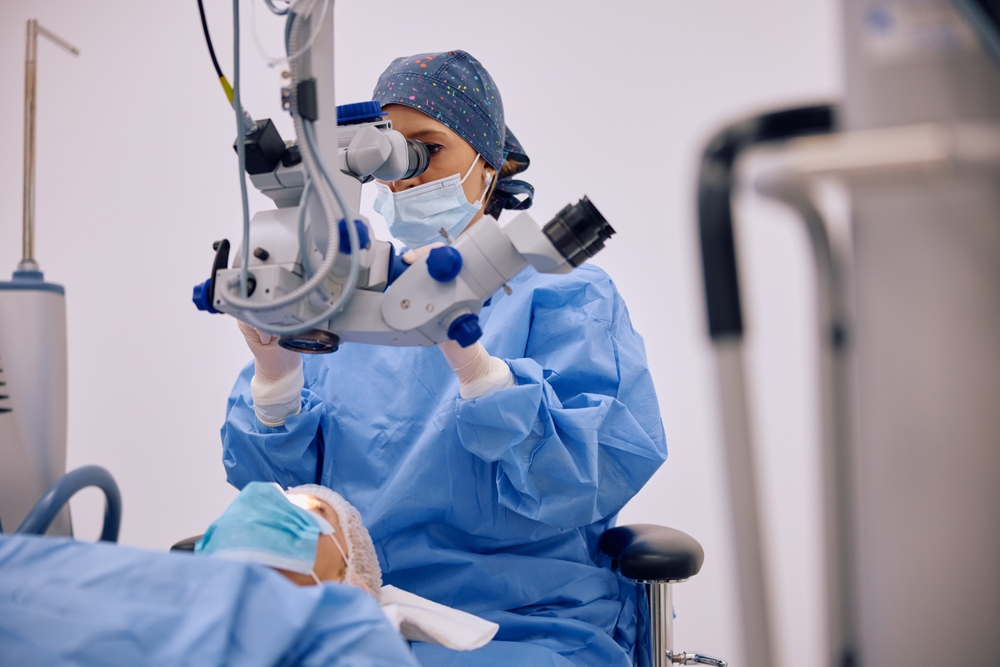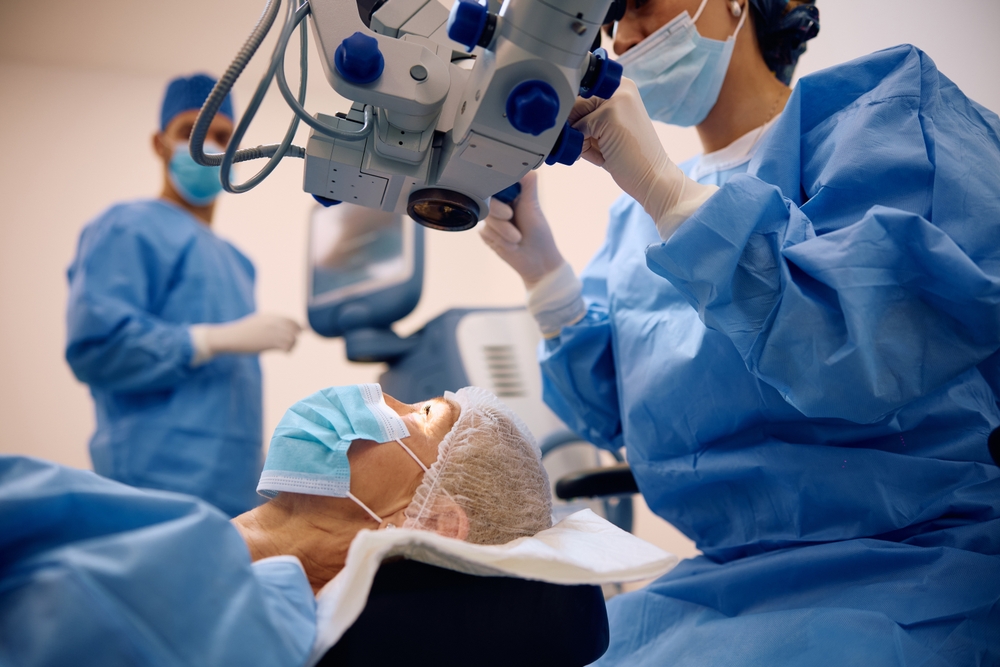Cataract surgery stands as one of the safest and most effective surgical procedures available. Yet, the outcome of your surgery depends not only on your surgeon’s skill but also on how well you prepare.
This guide walks you through everything you need to know before your cataract surgery, from the initial consultation through the day of your procedure. Knowing what to expect and how to prepare can reduce your anxiety and set you up for the smoothest possible experience and recovery.
The Pre-Operative Consultation
Preparation begins at your comprehensive pre-operative evaluation, typically scheduled several weeks before surgery.
During this visit, your eye care team performs detailed measurements of your eye to determine the correct power and type of intraocular lens for your needs. These measurements include corneal curvature, eye length, and anterior chamber depth. Accuracy during this appointment directly affects your visual outcome, so arrive well-rested and prepared to spend 60 to 90 minutes at the office.
Bring a complete list of all medications you currently take, including over-the-counter drugs, vitamins, and supplements. Certain medications, particularly blood thinners, may need adjustment before surgery, though many patients continue them without interruption. Your medical history matters too.
This consultation is your opportunity to ask questions about your specific situation. Discuss any concerns about the procedure, clarify post-operative expectations, and understand what intraocular lens options might benefit your lifestyle. Patients who feel informed and involved tend to experience less anxiety and better satisfaction with their outcomes.
Medical Preparations in the Weeks Before Surgery

Once your surgery is scheduled, several medical preparations help optimize your safety and results.
If you take blood-thinning medications like warfarin or aspirin, your surgeon and primary physician will decide together whether these need temporary adjustment. Many patients safely continue these medications, but individual circumstances vary. Never stop or change medications without explicit guidance from your medical team.
Eye drops often begin a day or two before surgery. These typically include antibiotics to reduce infection risk and anti-inflammatory medications to prepare the eye’s tissues.
Follow the prescribed schedule precisely, as these medications create optimal conditions for surgery and healing. Set phone reminders if you have trouble remembering multiple daily doses.
Logistical Preparations in the Weeks Before Surgery
Cataract surgery requires specific logistical arrangements that patients sometimes overlook until the last minute.
Transportation ranks among the most critical. You cannot drive yourself home after surgery because your vision will be blurry and you’ll have received medications that affect alertness. Arrange for a responsible adult to drive you to the surgical center and stay throughout the procedure to drive you home afterward. This person should also be available to help you at home for the remainder of the day.
Prepare your home environment before surgery day. Stock up on easy-to-prepare meals since you’ll want to minimize cooking and household tasks during the first day or two of recovery. Organize a comfortable recovery area with good lighting, extra pillows for sleeping with your head elevated, and entertainment like audiobooks or podcasts that don’t strain your eyes.
Fill any prescriptions for post-operative eye drops in advance so they’re ready when you return home. Your pharmacy should have these available before your surgery date. Having medications on hand eliminates the stress of making pharmacy stops when you’re trying to rest.
Create a medication schedule chart for your post-operative eye drops. You’ll likely use multiple types of drops several times daily, and tracking becomes easier with a simple checklist. Some patients find it helpful to prepare this chart in advance and post it near their drop storage location.
The Day Before Surgery
The final 24 hours before surgery involve specific instructions that vary slightly among surgeons but generally follow similar patterns. You’ll typically begin antibiotic eye drops if you haven’t already started them. Some eye doctors prefer starting these medications several days earlier, while others begin them the day before surgery.
Confirm your arrival time and location and plan to arrive 30 to 60 minutes before your scheduled procedure time for check-in, paperwork, and preparation.
Prepare what you’ll wear to surgery. Choose loose, comfortable clothing that doesn’t need to be pulled over your head. Button-front or zip-front shirts work better than pullovers.
Avoid wearing makeup, lotions, perfumes, or aftershave on surgery day, as these products can introduce contaminants near the surgical field. Skip hair products too, and plan to wash your face and hair the night before or morning of surgery..
Day of Surgery: What to Bring and Expect
On surgery day, bring your insurance cards, identification, and a list of current medications, even if you’ve provided this information before. Wear your glasses rather than contact lenses, and leave jewelry, valuables, and unnecessary items at home.

Your escort should bring something to occupy their time, as the entire process typically takes two to three hours from arrival to discharge, though your actual surgical time will be much shorter.
Expect to spend most of this time in pre-operative preparation. The nursing staff will verify your identity, review your medical history, and administer dilating drops, as well as possibly a mild sedative. The actual surgery takes 15 to 30 minutes for most patients.
The surgical team positions you comfortably, applies numbing drops, and places a sterile drape around your eye. You’ll remain awake but relaxed throughout the procedure.
After surgery, you’ll rest briefly in a recovery area while staff monitors your initial response. Your eye will be covered with a protective shield, and you’ll receive detailed written instructions for home care along with prescriptions for eye drops if you haven’t already filled them.
Most patients notice improved vision almost immediately, though some blurriness is normal for the first day or two.
Setting Yourself Up for Recovery Success
The hours and days immediately following surgery set the tone for your healing process. Rest is your primary job on surgery day.
Avoid bending over, lifting heavy objects, or engaging in strenuous activity. You can watch television, read, and perform light activities as comfort allows, but respect your body’s signals to rest.
Begin your prescribed eye drop regimen as instructed. Proper technique matters: wash your hands thoroughly, tilt your head back, pull down your lower eyelid to create a pocket, instill one drop, close your eye gently, and wait several minutes between different medications. Never let the dropper tip touch your eye or any surface.
Wear your protective eye shield while sleeping for the period recommended by your surgeon, typically one week. This shield prevents accidental rubbing or pressure on the healing eye.
Avoid getting water directly in your eye for at least one week. You can shower and wash your face, but keep your eye closed and use care to prevent soap or water from entering it.
Skip swimming, hot tubs, and other water activities for several weeks until your surgeon clears you.
Are you experiencing symptoms of cataracts? Schedule your cataract evaluation at Eye Care & Vision Associates in Buffalo, NY, to begin your journey toward clearer vision.

